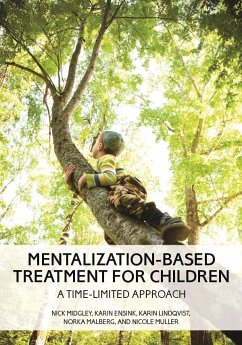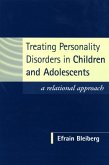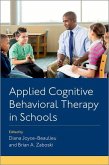Nick Midgley, Karin Ensink, Karin Lindqvist
Mentalization-Based Treatment for Children
A Time-Limited Approach
Nick Midgley, Karin Ensink, Karin Lindqvist
Mentalization-Based Treatment for Children
A Time-Limited Approach
- Broschiertes Buch
- Merkliste
- Auf die Merkliste
- Bewerten Bewerten
- Teilen
- Produkt teilen
- Produkterinnerung
- Produkterinnerung
This book is the first comprehensive clinical introduction to using Mentalization-based treatment (MBT) with children, 5-12 years old.
Andere Kunden interessierten sich auch für
![Children in a Violent Society Children in a Violent Society]() Joy Osofsky (ed.)Children in a Violent Society42,99 €
Joy Osofsky (ed.)Children in a Violent Society42,99 €![Applications of the Unified Protocols for Transdiagnostic Treatment of Emotional Disorders in Children and Adolescents Applications of the Unified Protocols for Transdiagnostic Treatment of Emotional Disorders in Children and Adolescents]() Jill Ehrenreich-MayApplications of the Unified Protocols for Transdiagnostic Treatment of Emotional Disorders in Children and Adolescents59,99 €
Jill Ehrenreich-MayApplications of the Unified Protocols for Transdiagnostic Treatment of Emotional Disorders in Children and Adolescents59,99 €![Treating Personality Disorders in Children and Adolescents Treating Personality Disorders in Children and Adolescents]() Efrain BleibergTreating Personality Disorders in Children and Adolescents42,99 €
Efrain BleibergTreating Personality Disorders in Children and Adolescents42,99 €![Meltzer in Venice Meltzer in Venice]() Meltzer in Venice37,99 €
Meltzer in Venice37,99 €![Group Play Interventions for Children: Strategies for Teaching Prosocial Skills Group Play Interventions for Children: Strategies for Teaching Prosocial Skills]() Linda A. ReddyGroup Play Interventions for Children: Strategies for Teaching Prosocial Skills53,99 €
Linda A. ReddyGroup Play Interventions for Children: Strategies for Teaching Prosocial Skills53,99 €![Appl Cognit Behav Therapy in Schools P Appl Cognit Behav Therapy in Schools P]() Diana Joyce-BeaulieuAppl Cognit Behav Therapy in Schools P72,99 €
Diana Joyce-BeaulieuAppl Cognit Behav Therapy in Schools P72,99 €![Cultural Competence and Healing Culturally Based Trauma with EMDR Therapy Cultural Competence and Healing Culturally Based Trauma with EMDR Therapy]() Cultural Competence and Healing Culturally Based Trauma with EMDR Therapy95,99 €
Cultural Competence and Healing Culturally Based Trauma with EMDR Therapy95,99 €-
-
-
This book is the first comprehensive clinical introduction to using Mentalization-based treatment (MBT) with children, 5-12 years old.
Hinweis: Dieser Artikel kann nur an eine deutsche Lieferadresse ausgeliefert werden.
Hinweis: Dieser Artikel kann nur an eine deutsche Lieferadresse ausgeliefert werden.
Produktdetails
- Produktdetails
- Verlag: American Psychological Association
- Seitenzahl: 268
- Erscheinungstermin: 31. Januar 2023
- Englisch
- Abmessung: 253mm x 174mm x 15mm
- Gewicht: 510g
- ISBN-13: 9781433842436
- ISBN-10: 1433842432
- Artikelnr.: 65828067
- Herstellerkennzeichnung
- Libri GmbH
- Europaallee 1
- 36244 Bad Hersfeld
- gpsr@libri.de
- Verlag: American Psychological Association
- Seitenzahl: 268
- Erscheinungstermin: 31. Januar 2023
- Englisch
- Abmessung: 253mm x 174mm x 15mm
- Gewicht: 510g
- ISBN-13: 9781433842436
- ISBN-10: 1433842432
- Artikelnr.: 65828067
- Herstellerkennzeichnung
- Libri GmbH
- Europaallee 1
- 36244 Bad Hersfeld
- gpsr@libri.de
Nick Midgley, PhD, trained as a child and adolescent psychotherapist at the Anna Freud National Centre for Children and Families and is a senior lecturer in the Research Department of Clinical, Educational and Health Psychology at University College London. He is the codirector of the Child Attachment and Psychological Therapies Research Unit (ChAPTRe) at Anna Freud/University College London and has published widely, including coediting the book Minding the Child: Mentalization-Based Interventions for Children, Young People and Families (Routledge, 2012). Karin Ensink, PhD, is a professor of child and adolescent psychology at the Université Laval in Québec, Canada, where she teaches mentalization-based treatment (MBT) and psychodynamic psychotherapy with children, adolescents, and parents. She completed her PhD under the direction of Mary Target and Peter Fonagy. Her research and clinical work continue to focus on the development and assessment of mentalization in children, adolescents, and parents. She has a particular interest in understanding failures of mentalization in the context of parent–child interactions and how this relates to psychopathology and personality, as well as treatment. Karin Lindqvist, MSc, is a clinical psychologist trained in MBT for children (MBT–C) and parents at the Erica Foundation, Stockholm, Sweden, where she works part time as a researcher and clinical psychologist. Dr. Lindqvist's research concerns psychodynamic psychotherapy with children, adolescents, and adults. She is trained in reflective functioning and has done research on mentalizing capacity in clinical samples. In addition to working at the Erica Foundation, she works with children in foster placement and their families in Stockholm. Norka Malberg, PsyD, is a certified child and adolescent psychoanalyst who trained at the Anna Freud Centre in London and obtained her doctorate at University College London for her adaptation of MBT to group work in a pediatric hospital setting. She is currently an assistant clinical professor at the Yale Child Study Center in New Haven, Connecticut, where she is also in private practice. She has a special interest in the applications of MBT to children in foster care as well as those experiencing chronic illness and other impinging somatic conditions (e.g., epilepsy, chronic eczema, asthma). Nicole Muller, MS, MSc, is a child and adolescent psychotherapist and family therapist based at the De Jutters Child and Adolescent Mental Health Service, The Hague, Netherlands. Originally trained as a cognitive behavioral therapist, she became interested in MBT, which she has used for many years in her work with children and adolescents with attachment disorder, trauma, or emerging personality disorder and their families. One of her areas of expertise is working with fostered and adopted children and their families
Foreword
Peter Fonagy
Acknowledgments
Introduction
Part I. Theoretical Framework
Chapter 1. The Development of Mentalizing
Chapter 2. When the Capacity for Mentalizing Is Underdeveloped or Breaks
Down
Part II. Description of the Therapeutic Approach
Chapter 3. The Structure and Aims of Time-Limited MBT–C
Chapter 4.The Therapist Stance in Time-Limited MBT–C
Chapter 5. The Process of Assessment in Time-Limited MBT–C
Chapter 6. Direct Work With Children in Time-Limited MBT–C
Chapter 7. Working With Parents From a Mentalization-Based Framework
Chapter 8. Moving Toward Goodbye: Endings in Time-Limited MBT–C
Chapter 9. Time-Limited MBT–C: A Case Study
Conclusion: Looking Back and Looking Forward
Appendix: Measures of Reflective Functioning in Children and Parents
References
Index
About the Authors
Peter Fonagy
Acknowledgments
Introduction
Part I. Theoretical Framework
Chapter 1. The Development of Mentalizing
Chapter 2. When the Capacity for Mentalizing Is Underdeveloped or Breaks
Down
Part II. Description of the Therapeutic Approach
Chapter 3. The Structure and Aims of Time-Limited MBT–C
Chapter 4.The Therapist Stance in Time-Limited MBT–C
Chapter 5. The Process of Assessment in Time-Limited MBT–C
Chapter 6. Direct Work With Children in Time-Limited MBT–C
Chapter 7. Working With Parents From a Mentalization-Based Framework
Chapter 8. Moving Toward Goodbye: Endings in Time-Limited MBT–C
Chapter 9. Time-Limited MBT–C: A Case Study
Conclusion: Looking Back and Looking Forward
Appendix: Measures of Reflective Functioning in Children and Parents
References
Index
About the Authors
Foreword
Peter Fonagy
Acknowledgments
Introduction
Part I. Theoretical Framework
Chapter 1. The Development of Mentalizing
Chapter 2. When the Capacity for Mentalizing Is Underdeveloped or Breaks
Down
Part II. Description of the Therapeutic Approach
Chapter 3. The Structure and Aims of Time-Limited MBT–C
Chapter 4.The Therapist Stance in Time-Limited MBT–C
Chapter 5. The Process of Assessment in Time-Limited MBT–C
Chapter 6. Direct Work With Children in Time-Limited MBT–C
Chapter 7. Working With Parents From a Mentalization-Based Framework
Chapter 8. Moving Toward Goodbye: Endings in Time-Limited MBT–C
Chapter 9. Time-Limited MBT–C: A Case Study
Conclusion: Looking Back and Looking Forward
Appendix: Measures of Reflective Functioning in Children and Parents
References
Index
About the Authors
Peter Fonagy
Acknowledgments
Introduction
Part I. Theoretical Framework
Chapter 1. The Development of Mentalizing
Chapter 2. When the Capacity for Mentalizing Is Underdeveloped or Breaks
Down
Part II. Description of the Therapeutic Approach
Chapter 3. The Structure and Aims of Time-Limited MBT–C
Chapter 4.The Therapist Stance in Time-Limited MBT–C
Chapter 5. The Process of Assessment in Time-Limited MBT–C
Chapter 6. Direct Work With Children in Time-Limited MBT–C
Chapter 7. Working With Parents From a Mentalization-Based Framework
Chapter 8. Moving Toward Goodbye: Endings in Time-Limited MBT–C
Chapter 9. Time-Limited MBT–C: A Case Study
Conclusion: Looking Back and Looking Forward
Appendix: Measures of Reflective Functioning in Children and Parents
References
Index
About the Authors








